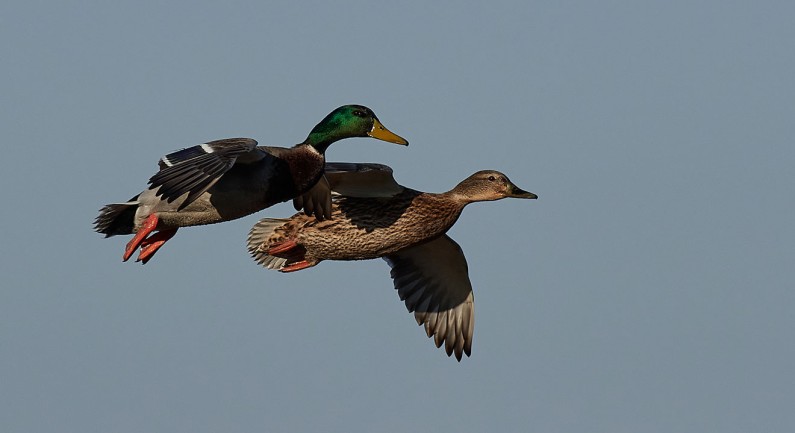

Wildlife disease specialists have confirmed the re-occurrence of the Eurasian strain of Highly Pathogenic Avian Influenza (HPAI) H5N1 in California wild birds.
In late October, Canada geese were found dead in Sacramento County and submitted to the California Department of Fish and Wildlife’s (CDFW) Wildlife Health Laboratory for testing. Preliminary testing was performed at the California Animal Health and Food Safety Laboratory in Davis.
The U.S. Department of Agriculture’s (USDA) National Veterinary Services Laboratories confirmed the detection of HPAI H5N1 in two Canada geese in early November. Subsequent detections have been made in wild birds in several additional counties during mortality surveillance including from Contra Costa, San Diego, Santa Clara, Solano and Yolo. Detections in waterfowl during hunter-harvest surveillance have been reported from Fresno, Glenn, Kern and Yolo counties. Prior to these detections, the last confirmed detection in wild birds occurred in June 2023.
This strain of Eurasian HPAI H5N1 has been circulating in the United States and Canada since the winter of 2021-22, arriving in California in mid-July 2022. In total, 354 confirmed detections of the virus were made in wild birds collected from 44 California counties during mortality surveillance conducted between July 2022 and June 2023. Detections of the virus appeared to subside during spring and summer in California, as well as more broadly in the United States. Now, as waterfowl and other waterbirds are undertaking fall migration, cases again are on the rise.
Avian influenza spreads through direct bird-to-bird contact and may also spread to birds through contaminated surfaces including hands, shoes, clothing and hunting gear. While the Centers for Disease Control considers the transmission risk of avian influenza to people to be low, residents and waterfowl hunters are advised to take precautions to protect themselves, hunting dogs, falconry birds, poultry and pet birds.
Steps that may help reduce the spread of HPAI:
- Report dead wild birds, and other wildlife, to CDFW using the mortality reporting form. While it is not possible to test every wild bird for HPAI, all mortality reports are important and help disease specialists monitor the outbreak.
- Report sick and dead poultry to the California Department of Food and Agriculture (CDFA) hotline at 1 (866) 922-2473.
- Prevent contact between domestic birds and wild birds, especially waterfowl. Exclude wild birds from accessing chicken or other domestic bird feed and water.
- Do not feed waterfowl or other waterbirds at park ponds as it may increase the congregation of birds and contribute to disease spread.
- Do not bring potentially sick wild birds home or move sick birds to another location.
- Before transporting potentially sick wild birds to wildlife rehabilitation centers, veterinary clinics, or other animal facilities, contact the facility for guidance and to determine if the bird should be collected.
- If recreating outdoors in areas with large concentrations of waterfowl and other waterbirds, wash clothing and disinfect footwear and equipment before traveling to other areas or interacting with domestic birds.
- Where it can be done so safely, consider disposing of dead birds to help reduce exposure to new birds and minimize scavenging by birds and mammals that also may be susceptible to infection. Dead birds may be collected into a plastic bag and placed in the regular trash collection.
Additional safety recommendations for waterfowl hunters:
- Harvest only waterfowl that look and behave healthy. Do not handle or eat sick game. Do not handle wild birds that are obviously sick or found dead.
- Field dress and prepare game outdoors or in a well-ventilated area. Do not dress wild game in the vicinity of poultry or pet birds.
- Wear rubber gloves or other impermeable disposable gloves while handling and cleaning game.
- Remove and discard intestines soon after harvesting and avoid direct contact with intestinal contents. Place waste in a plastic bag and dispose in a garbage container that is protected from scavengers.
- Do not eat, drink, smoke or vape while handling dead game.
- When done handling game, wash hands thoroughly with soap and water (or alcohol-based hand sanitizer if soap and water are unavailable), and clean knives, equipment and surfaces that came in contact with game. Wash hands before and after handling any meat.
- Keep harvested waterfowl cool (either with ice or refrigeration), below 45 degrees Fahrenheit, until processed, and then refrigerate or freeze.
- Thoroughly cook all game to an internal temperature of 165 degrees Fahrenheit before consuming.
- Clean and disinfect clothing, footwear and hunting gear before traveling to other areas. As appropriate, footwear and gear may be washed with soap and water, then disinfected in household bleach diluted 1:10 with water for at least 10 minutes.
- Bathe hunting dogs with pet shampoo after hunting, and do not feed dogs raw meat, organs or other tissues from harvested waterfowl.
- Falconers should avoid hunting waterfowl, and other waterbirds, during the HPAI outbreak.
For more information on HPAI H5N1, check out CDFW’s informational flyer addressing frequently asked questions and links to additional resources. The USDA maintains the official list of HPAI H5N1 detections on its website. For guidance on keeping domestic birds healthy, please visit the CDFA and USDA websites.
For guidance on orphaned or injured live wild birds, please contact your nearest wildlife rehabilitation center prior to collecting the animal. Be advised that some wildlife rehabilitation centers may have restrictions on the wildlife species they will admit.

You must be logged in to post a comment Login